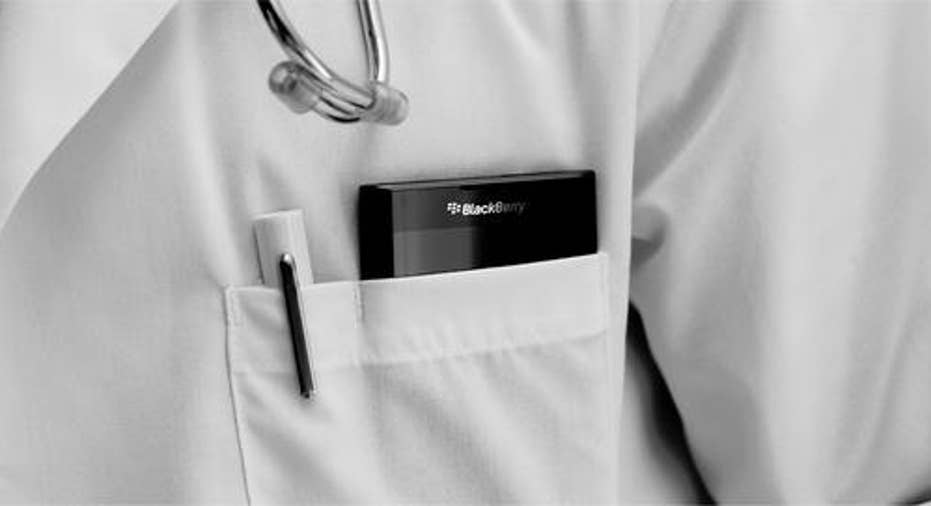Can BlackBerry Ltd. Rebound From Its Latest Earnings Miss?

Shares of BlackBerry tumbled after it reported mixed fourth quarter earnings on April 1. The struggling handset maker's non-GAAP revenue fell 26% annually to $487 million, missing estimates by $76 million. 39% of that total came from hardware sales, 29% came from service access fees (SAF), and 32% came from its closely watched software and services segment. On the bottom line, BlackBerry reported a non-GAAP net loss of $18 million, or $0.03 per share, beating estimates by seven cents.
Source: BlackBerry.
Software and services revenue more than doubled annually to $153 million and reached $527 million for the full year -- exceeding BlackBerry's own target of $500 million. Unfortunately, that growth didn't offset its 31% decline in hardware sales during the fourth quarter. But looking ahead, BlackBerry believes that its software sales will rise 30% in fiscal 2017, offsetting sluggish hardware sales and helping it become profitable within the year. Is that a realistic goal, or will shifting market trends throttle its software sales growth as well?
BlackBerry's hardware strategyBlackBerry handsets were once considered indispensable tools for enterprise users. But improved security and enterprise apps for Apple'siPhone and Alphabet's Android devices gradually blurred the lines between personal and professional devices, allowing iOS and Android to enter the enterprise market. Between the fourth quarters of 2009 and 2015, BlackBerry's global market share in smartphones plunged from20% to 0.2%.
BlackBerry CEO John Chen, who took over as CEO in late 2013, realized that the company needed to pivot its business toward software to survive. Under Chen, BlackBerry reduced the number of BlackBerry devices launched annually, introduced cheaper devices, and finally introduced the Android-powered Priv at the end of 2015. It also plans to launch a cheaper $350 Android handset in the near future, but there are doubts that it can stand out in a market saturated with cheap and powerful Android devices.
The Priv. Source: BlackBerry.
During last quarter's conference call, Chen declared that BlackBerry needs to sell three million phones at an average price of $300 for the hardware business to "break even" in fiscal 2017 (which started on March 1). This means that BlackBerry would need to grow its smartphone revenue from $870 million this fiscal year to $900 million next year. That positive reversal would be hard to accomplish after years of declines, but declining sales might give the unit a softer landing and buy more time for its software business to grow.
BlackBerry's software strategyBlackBerry's software business has four main growth drivers -- BlackBerry Enterprise Service (BES), which monitors mobile devices across multiple platforms; BlackBerry Messenger (BBM), a messaging app for enterprise users; QNX, an embedded OS which powers most connected cars in the world; and Good Technology, a mobile device management vendor it acquired for $425 million last year.
Last quarter, BlackBerry launched a new tracking platform for Internet of Things devices, five secure enterprise mobility management suites which merge BlackBerry and Good technologies, and a cybersecurity consulting service which helps customers assess and mitigate risks. These new services let BlackBerry leverage its well-established reputation in enterprise security to evolve from a burnt-out smartphone maker into a provider of "all-seeing" software which helps companies monitor devices which run on iOS, Android, Windows, and BB10. These services will generate a more stable stream of high-margin revenue for BlackBerry, which would be preferable to the hit-driven low-margin world of smartphones.
If BlackBerry can grow its software revenue another 30% to about $685 million this year, it would account for36% of its estimated sales. That marks solid progress, but total sales are still expected to fall 14% this year and 12% next year -- indicating that hardware sales will likely remain a dead weight until software sales firm up.
Can BlackBerry bounce back?I personally believe that Chen's strategy of pivoting toward software and cutting costs is the best play for BlackBerry. Unfortunately, the company still faces too many headwinds to be considered a turnaround play. Android devices, even cheap ones, are unlikely to boost BlackBerry's hardware sales in a cutthroat market where even market leaders like Samsung and Xiaomi are struggling.
As long as hardware sales are declining, SAF revenue will also fall, leaving software as its only pillar of growth. Unless BlackBerry can stop that bleeding with surprisingly robust hardware sales or stronger-than-expected software growth, I seriously doubt that the stock can reverse its near-90% decline over the past five years.
The article Can BlackBerry Ltd. Rebound From Its Latest Earnings Miss? originally appeared on Fool.com.
Suzanne Frey, an executive at Alphabet, is a member of The Motley Fool's board of directors. Leo Sun has no position in any stocks mentioned. The Motley Fool owns shares of and recommends Alphabet (A shares), Alphabet (C shares), and Apple. Try any of our Foolish newsletter services free for 30 days. We Fools may not all hold the same opinions, but we all believe that considering a diverse range of insights makes us better investors. The Motley Fool has a disclosure policy.
Copyright 1995 - 2016 The Motley Fool, LLC. All rights reserved. The Motley Fool has a disclosure policy.



















